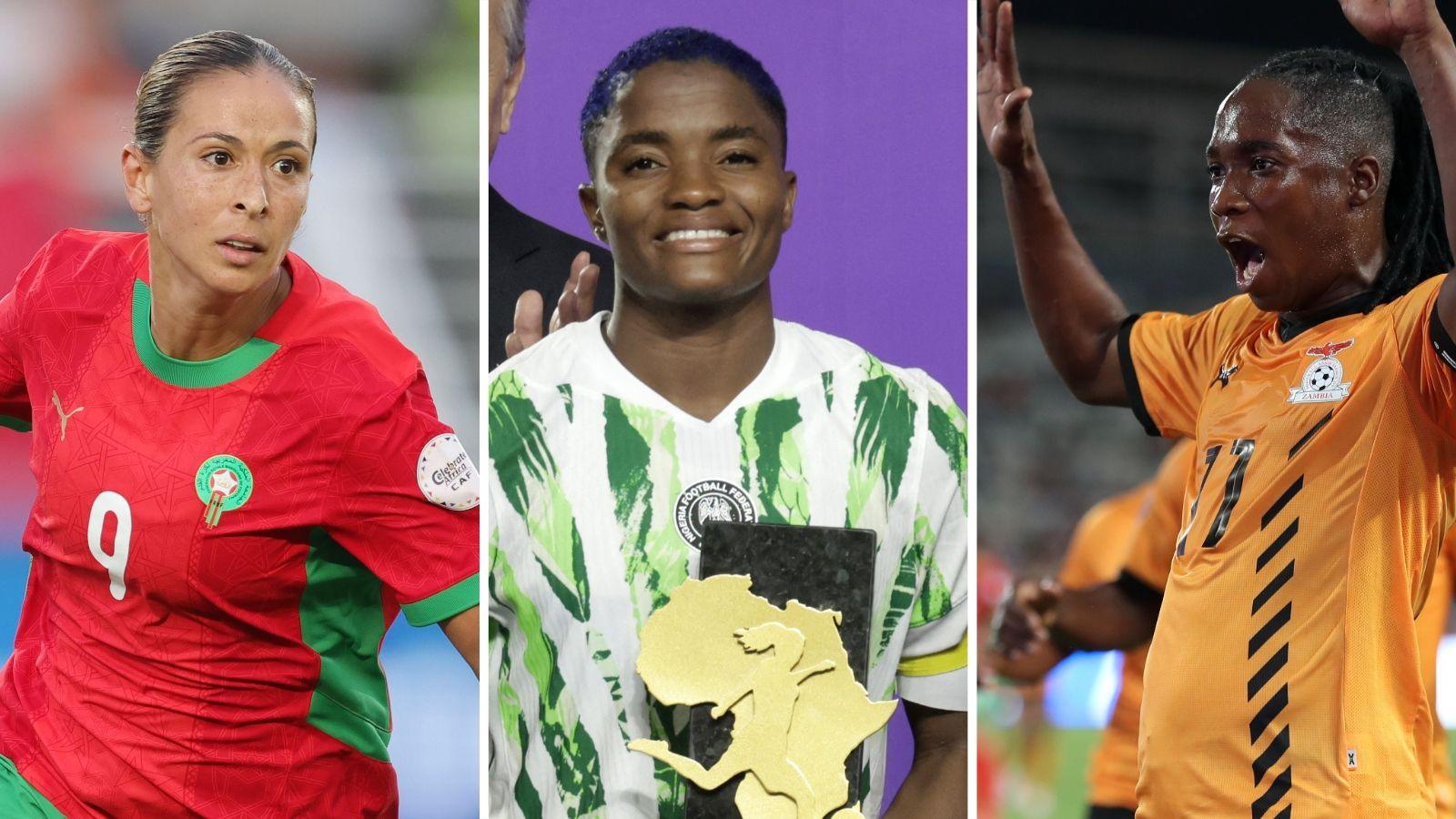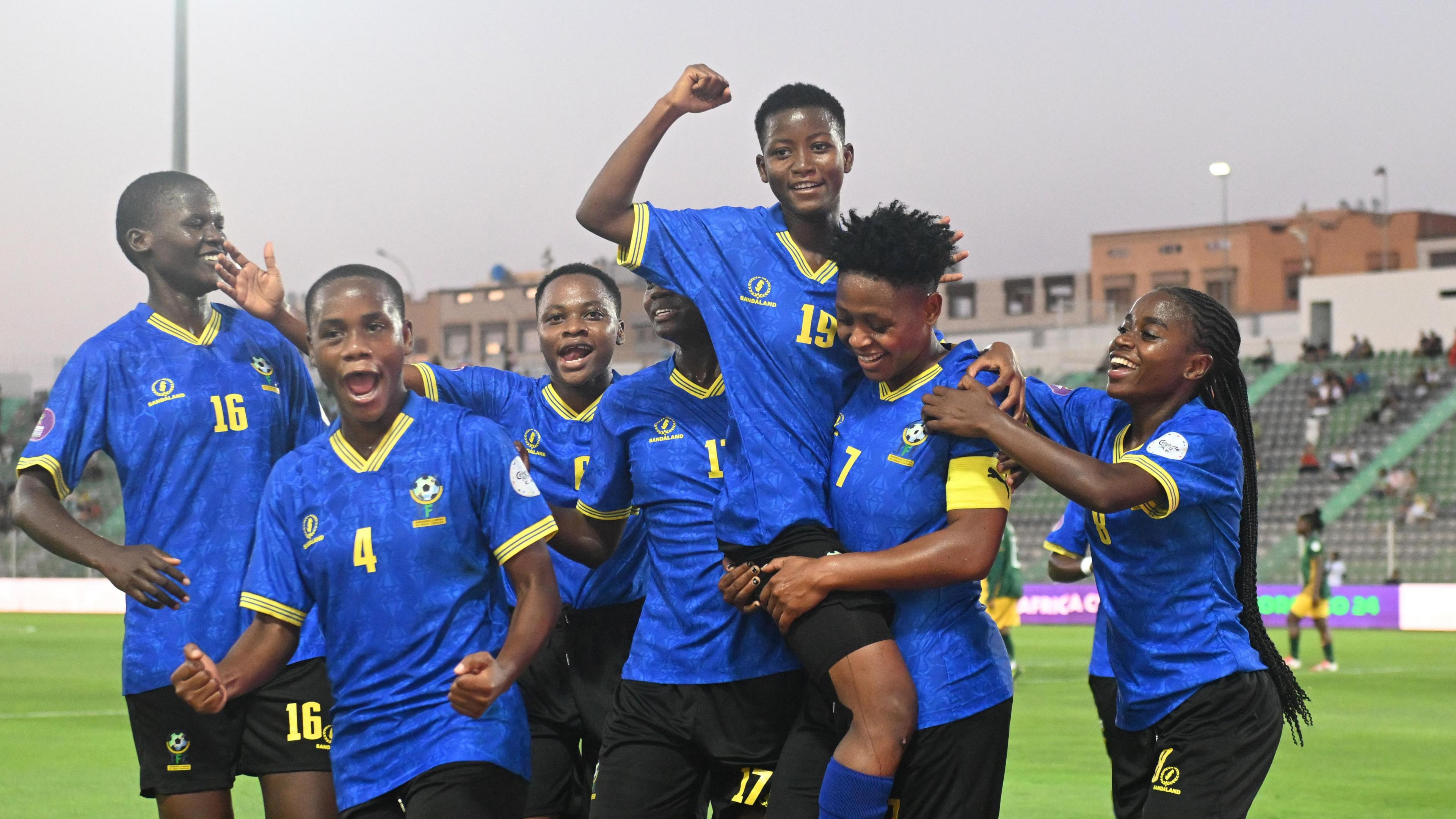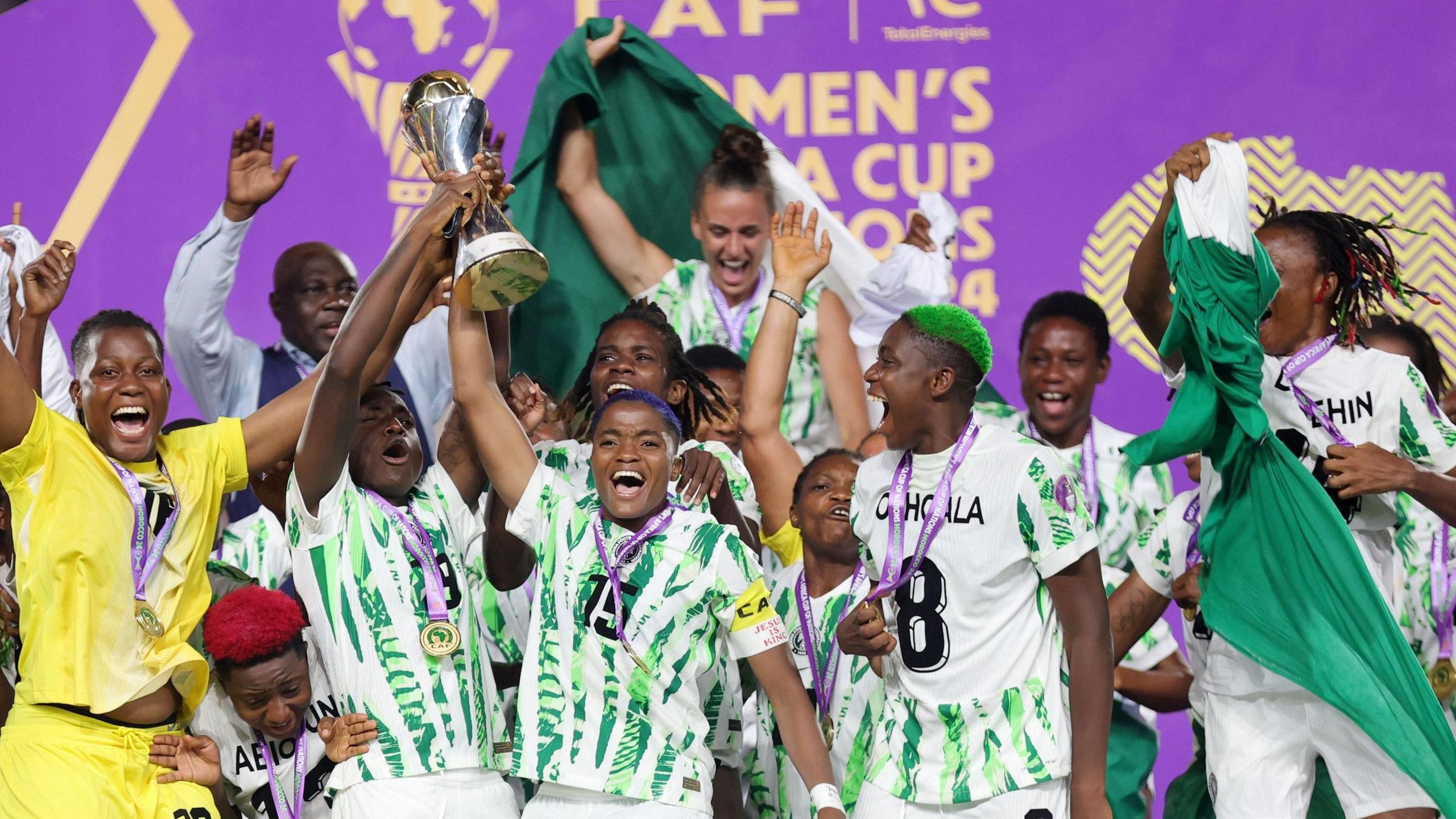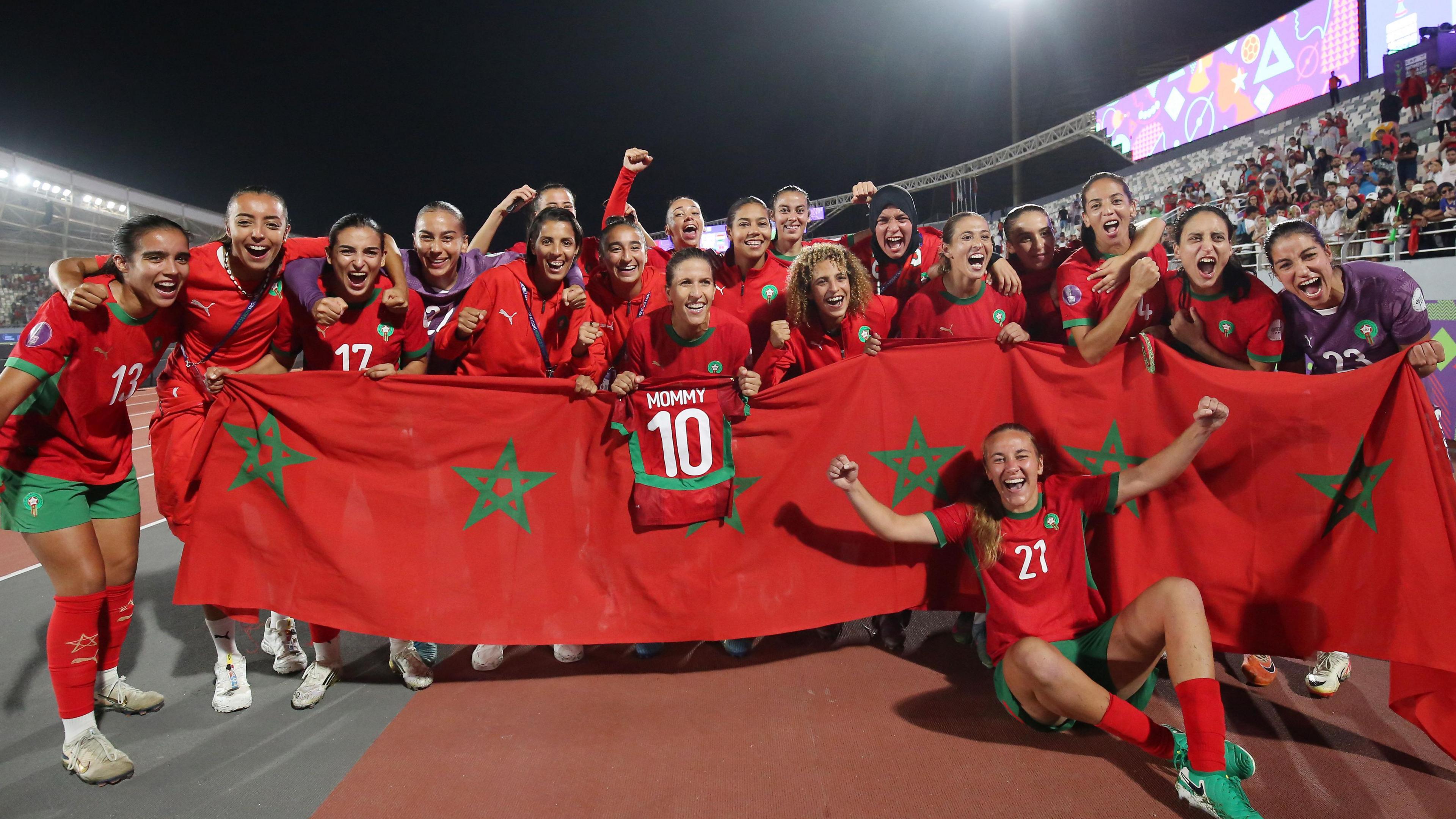What we learned from Women's Africa Cup of Nations 2024

Nigeria captain Rasheedat Ajibade (centre) was named player of the tournament as her side beat Zambia and South Africa en route to their victory over Morocco in the final
- Published
Nigeria clinched a record-extending 10th Women's Africa Cup of Nations (Wafcon) title in Rabat on Saturday.
The final will live long in the memory after the West Africans fought back from 2-0 down at half-time to beat hosts Morocco.
The Super Falcons also picked up $1m (£745,000) after the Confederation of African Football (Caf) boosted the overall prize fund for the delayed 2024 edition of the finals.
Yet the tournament in Morocco threw up several issues which Caf and national federations need to address in order to boost the women's game on the continent.
The attendance conundrum
South Africa coach Desiree Ellis was among those to criticise the scheduling delay in staging the 2024 finals - and the tournament being played at the same time as the 2025 European Championship restricted international media coverage.
Morocco games drew capacity crowds to the Olympic Stadium in the capital, but the neighbouring and much larger Prince Moulay Abdellah Stadium, which drew an African-record crowd of over 50,000 when it hosted the final three years ago, could not be used because it is being renovated ahead of the 2025 Africa Cup of Nations (Afcon) which begins in December.
Attendances at matches not involving the Atlas Lionesses were disappointingly low, with little signposting of the competition in host cities away from stadiums, while overseas supporter numbers are often restricted by the high costs associated with travelling across the continent.
"We need time to progress but we are certain, with the potential that we have, we will reach the level of sister competitions," Caf general secretary Veron Mosengo-Omba told BBC Sport Africa.
Caf points out that an immediate comparison to the packed venues seen in Switzerland at this month's Euros comes with a caveat.
"Europe, to reach this level, started about 25 or 30 years [ago]," Mosengo-Omba said.
"Success is not built in one day. The potential is there, but give us the time to work hard."
The standard on the pitch

Tanzania claimed a draw with holders South Africa in the group stage, picking up their first ever point at Wafcon, despite a gap of 83 places in the world rankings
The four lowest-ranked sides were the ones eliminated at the end of the group stage but Wafcon 2024 largely saw an improved level of competitiveness.
That in particular was marked by Algeria reaching the knockout phase for the first time - exiting the finals without conceding a goal - and Senegal pushing South Africa all the way to penalties in the last eight.
However, the first round of qualifying for the 2026 Wafcon has featured several one-sided ties and next year's finals will again include 12 sides.
Caf is keen to raise standards across the continent before expanding the finals further.
"The executive committee is discussing [an] increase in the number of teams for the next edition and also to reinforce our domestic leagues," Mosengo-Omba revealed.
"We know that there are a lot of barriers that we have to fold down in order to make progress."
Caf also faces a challenge to strengthen the Women's African Champions League, its flagship continental club tournament, which will retain its format as an eight-team tournament played in a two-week window.
Wafcon winner will stay in my heart forever - Echegini
- Published27 July
Bridging the gender pay gap

Nigeria picked up $1m for winning Wafcon 2024 - but Ivory Coast's men got $7m for their triumph at the 2023 Africa Cup of Nations
The all-too-frequent problems that blight African football tournaments were present again, with South Africa and DR Congo enduring disputes over bonus payments, allowances and conditions.
Nigeria captain Rasheedat Ajibade called out Caf over the state of their accommodation ahead of the finals, and the Super Falcons were moved to an alternative hotel as a result.
A gender pay gaps remains even if Caf doubled the prize money for the winners, handed $500,000 (£372,000) to runners-up Morocco and boosted the overall prize fund by 45% to $3.45m (£2.57m).
Yet those figures pale when compared to the $7m (£5.2m) Ivory Coast got for winning the 2023 Afcon, when even runners-up Nigeria received $4m (£3m).
Wages for club players on the continent are stubbornly low compared to male counterparts, and former Nigeria forward Desire Oparanozie feels they deserve more.
"The discrepancy is as big as the ocean," she said.
"It's not deserving because we're doing the same sport. And for example, the United States national team, between the male and the female, who wins more laurels?
"Even with my national team Nigeria, the Super Falcons and Super Eagles, the women have had more success than the men."
More investment needed

Morocco leads the way when it comes to investment in the women's game in Africa - but their wait for a first international trophy goes on
One potential source of income could be from improved broadcast deals and commercial contracts, even if viewers for the women's game are lower than men's matches.
"We play the same sport but it's not the same world. We can understand that," Morocco forward Sakina Ouzraoui said.
"We are always asking for more viewers, but we cannot have that tomorrow, so we have to be patient."
Caf has been busy signing sponsorships for the 2025 Afcon but now needs to build on corresponding deals for Wafcon.
One executive from a multinational which recently partnered with Caf for Afcon said his company is "absolutely" interested in expanding its sponsorship to the women's game.
"Women's football is a sport, but it's also a business," Ghana forward Chantelle Boye-Hlorkah told BBC Sport Africa.
"So, for me, the more fans that are engaging in women's football, the more shirt sales, the more broadcast views, that's only going to make the women get paid more."
The Royal Moroccan Football Federation (RMFF) leads the way when it comes to supporting the club game in Africa - although their strategy is backed fully and bankrolled by funds from King Mohammed VI.
The North African nation aims to establish its women's league as the best on the continent and the RMFF provides $500 (£373) a month per player to each top-flight club to help guarantee salaries.
However, no other country has such reserves. Instead, they largely rely on prize money and distributions from Caf and world governing body Fifa.
Caf may have asked for patience on attendances at Wafcon, but Morocco will have an early chance to improve on the current benchmark when the 2026 finals - scheduled to be played in March next year - come around.